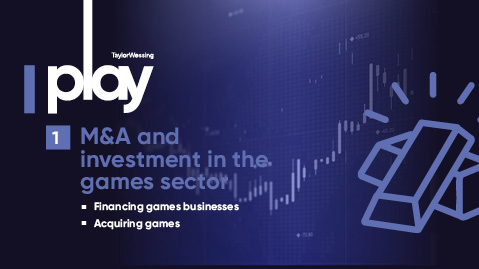- Home
- News & insights
- Insights
- Play: M&A – investin…

9 July 2021
Play: our guide to the video games industry – 2 of 4 Insights
Play: M&A – investing in and acquiring video game companies
- On this page
Gaming was the great connector in 2020 and 2021. In the absence of real-life experiences, the virtual world has taken off. And so has the market. The last few years have seen massive growth and increased deal activity as both existing industry players and new investors look for opportunities in one of the main outperformers of the pandemic economy.
In the latest edition of Play, our legal guide for the video gaming industry, we explain how gaming companies are looking at innovative M&A as the best, most efficient path to secure revenue growth and expand market share in a rapidly evolving sector. We have seen increased levels of confidence in M&A as a route to creating profitable companies while also responding to player desire for increasingly interconnected and social experiences in gaming. This trend looks set to continue.
Deal time and process
Whether you're a multinational publisher making a strategic investment in the industry's hottest property (Sony invests $250 million in Fortnight developer Epic Games), a financial institution investing in the sector for the first time, (Carlyle Group acquires RuneScape publisher Jagex), or the founder of an indie start-up preparing for that life-changing investment in your studio, (Beat Sabre developer acquired by Facebook), these types of transaction will inevitably raise several critical legal issues and require expert advice on the most appropriate deal process to achieve the best outcome for all stakeholders.
In an outright acquisition, the deal will typically be driven by the seller. In a competitive auction (multiple potential buyers), the process can result in a longer and more complex deal process, but it helps to maximise price. Potential buyers can be trade buyers (notably other games companies), Private Equity houses, who have shown significant interest in the sector in the last couple of years, or SPACs - a new separate pool of capital, some of which focus specifically on the gaming sector. You will need an advisory team that can help you navigate the different requirements of these various categories of buyer and guide you as to how best to negotiate with them.
Due diligence and regulatory requirements
Considering due diligence in advance of a sale or investment can shorten the deal length and support any current or future regulatory requirements. Companies should execute a well-organised and considered data room as a state of readiness for investor relations, which can be expanded when needed. Further due diligence may be required due to regulatory challenges around such issues as consumer and data protection, increased consumption, player protection, and monetization.
Key stakeholders
There are several key stakeholders during a transaction, from founders and employees to VC or institutional investors. For an M&A exit, existing investors will likely be focused on the terms of the deal documents and funds flow, maximising cash they will receive on day one and ensuring it mirrors the waterfall in the current investment documents.
Securing post deal management involvement, and long-term incentive structures, can play a crucial part in the deal, particularly for the management team in a Private Equity deal where the future equity participation arrangements can be key. We can guide management teams through the terms applicable to such equity participation and the key issues of which they should be aware.
Intellectual property and technology ownership
Ownership and protection of key intellectual property and technology is an essential part of the M&A process. From well-executed employee contracts vesting IP rights in the Company to technology contracting and licencing. All play a key role in the event of an M&A transaction.
(See section on IP for more information)
In this series
Play: the 4th edition of our guide to the video games industry
Download the guide
22 June 2021
by Multiple authors


